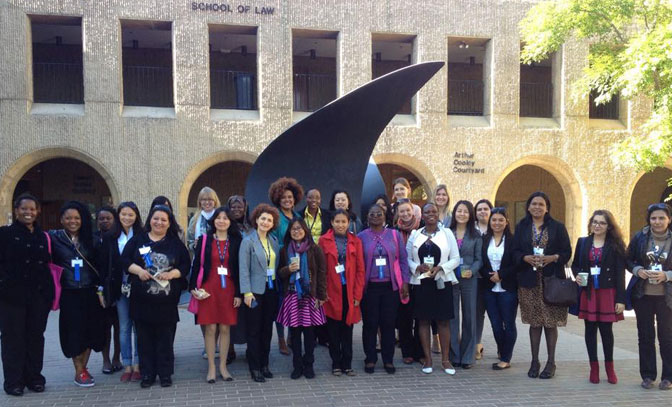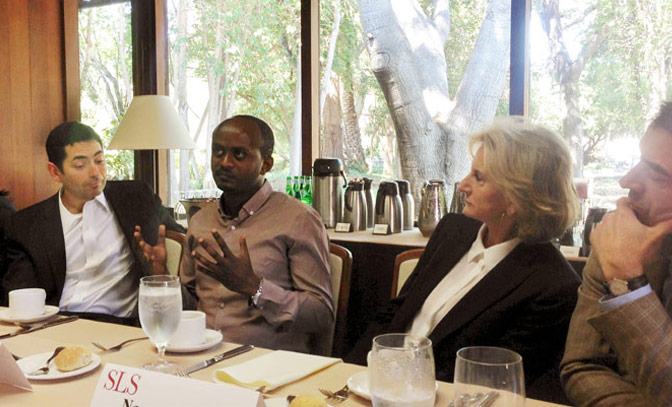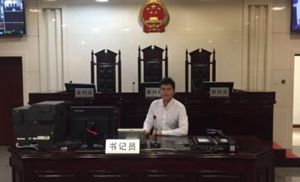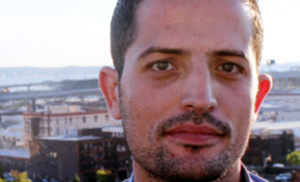Overview
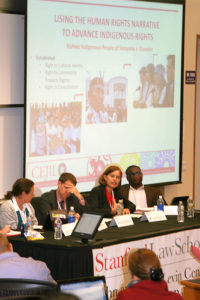
In response to the globalization of public interest lawyering and growing student interest in pursuing international careers, the Levin Center has developed an international program that connects students and alumni to educational opportunities and careers in this growing field.
Legal practice is globalizing at a rapid rate. Virtually every arena of public interest law — from environmental law to criminal law, from public health law to national security law — has international aspects. At the same time, certain strategies such as human rights, rule of law and development finance are more commonly deployed in international as opposed to domestic practice. In order to address these complexities, the Center provides individualized career counseling and career development resources to respond to the specific needs of students who are planning to pursue international public interest careers.
The Levin Center also partners with public interest attorneys seeking to build rule of law in transitional societies. The Levin Center has hosted visiting fellows from a number of transitional societies around the world and has given them the opportunity to mentor our students and to connect with resources that address leadership and organizational development challenges and opportunities in their home countries.
Kevin Lo, who directs the program, teaches courses on the role of law in social change in a global context and on lawyering and leading in transitional societies.
Resources for Students Working Overseas
LOGISTICS
Be sure to review Stanford’s portal for students going overseas, and this comprehensive Travel Checklist that includes the following key travel steps that you can take as early as 6 months prior your trip.
- Review the Office of International Affairs’ Travel Advisories and Pre-Travel Risk Assessment
- Book and register your travel
- For medical services during your travel, check out Vaden Health Center’s Travel Clinic, Stanford Hospital and Clinics’ Travel Medicine Clinic, and — for faculty and staff — Stanford Environmental Health & Safety’s Occupational Health Center
- See University IT’s Security Recommendations and Mobile Device Tips
CULTURAL COMPETENCY
Good resources on culture and why it matters:
http://www2.pacific.edu/sis/culture/
http://www.culturecrossing.net/
Other Questions to Ask (from Stanford website)
- What dress is considered appropriate in the host country, both in hot and cold weather?
- Are gender roles different than at home?
- What is the host country’s impression of people from your country?
- What things can you learn/bring/do to show respect for your hosts and a willingness to learn about the culture? e.g., Are there any famous authors from your host country? Read something they wrote before you go!
- How are ethnicity and race viewed/discussed (or not discussed)?
- How is class measured/viewed/discussed (or not discussed)?
- How is time treated (e.g., for an event at 6 pm, should you show up at 6 pm or 8 pm?)
SUMMER JOB SUCCESS
Common sense preparation that makes even more sense for overseas placements:
- Do the necessary research about an organization before beginning to work there: Who is on the Board? What are their funding sources, relevant cases, future goals?
- Call your supervisor before you start and have a conversation about what you will be working on, express preferences if that makes sense.
– Clarify overall expectations
– Make a plan for structured feedback
– Ask questions about organizational culture - Be sure your precise start and end dates are confirmed. Because you will be reserving plane tickets and making housing arrangements, any minor changes on the employer’s side could be extremely inconvenient and/or expensive for you. Also, if you are planning to come back for OCI you don’t have a lot of leeway in terms of scheduling if you are to get in a full 10 weeks of work.
When you are there, pay particular attention to:
- Be culturally aware—review the resources above.
- Be flexible—you may not have the permanent office or the technological resources that you’re used to. Be creative and don’t let these conditions distract you from the valuable experience you can gain and the significant contribution you can make.
- Ask for detailed, consistent feedback. Because you are in a very different office context, it is particularly important to not make assumptions about your supervisor’s expectations. Try to schedule weekly meetings with your supervisor—stay late and you’ll have more opportunities for feedback: clients stop calling, support staff have gone home.
In addition, review Stanford Law School’s Public Interest Career Handbook and their Summer Job Success pointers (summarized below):
- Produce good work product
- Request feedback on your work
- Understand your client’s problem
- Be creative
- Ask questions
- Meet deadlines
- Think about getting a writing sample
- Building your network during your summer experience
- Be respectful
- Confidentiality
REACHING OUT TO ALUMNI
Alumni, especially in overseas locations, are often very excited to hear from current students and can be a terrific resource. You should reach out to alumni with whom you share common interests etc. to schedule coffee or tea before you depart for the summer. You can find listings of regional alumni chapters and their contacts here.
You can search for individual alumni based on various criteria here.
Finally, you should check this page frequently for updated information on alumni events in your area this summer.
REACHING OUT TO ADVANCED DEGREE STUDENTS
We have LLM, JSM, and JSD students here from all over the world, and they are a great resource for JD students preparing for a summer abroad. You can find student profiles here.
You can contact the Advanced Degree Student Association as well as advanced degree students you meet through classes, the dormitories or other activities.
INTERNATIONAL LEGAL RESEARCH
Conducting international and comparative law research while you are overseas will present some unique challenges.
Follow these links for two resources developed by the SLS library:
https://stanford.app.box.com/s/inrlobbjq643gu16ekm4
https://stanford.app.box.com/s/jfkc37ayyeu9aw37a0k0
SLS’ Foreign, Comparative and International Law Librarian extraordinaire, Sergio Stone, who also serves as the Deputy Director of our Law Library, is an invaluable resource and he has indicated he is happy to meet with students before they depart for the summer. You should also look out for training sessions he offers on foreign, comparative and international research.
Time and resources permitting, reference librarians will field research questions from students over the summer. They can be reached at reference@law.stanford.edu.



